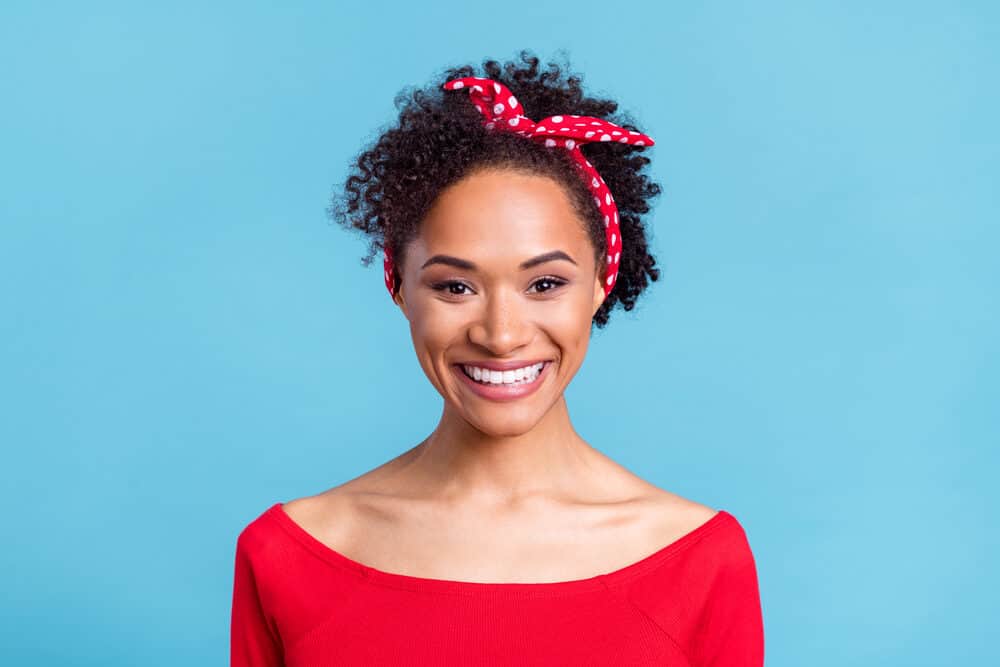
Conditioning your hair leaves it feeling soft and luxurious and even makes it easier to style. This is why so many people have been tempted to ditch the shampoo and try conditioner-only washing.
If you're considering conditioning your hair daily, keep on reading. In this article, we're going to take a look at the effects of conditioning your hair every day without shampooing it first.
Table of Contents
- 1 Can I Condition My Hair Everyday Without Shampooing?
- 2 Key Takeaways
- 3 Benefits and Risks of Conditioning Every Day Without Shampooing
- 4 The Conditioner You Use Matters
- 5 What Type of Conditioner is Best For Everyday Use?
- 6 Frequently Asked Questions
- 6.1 Can You Use Conditioner Instead of Shampoo?
- 6.2 Is It OK to Condition Your Hair Every Day?
- 6.3 Should I Condition My Hair Every Day?
- 6.4 What Happens if You Condition Your Hair Every Day?
- 6.5 What Happens if I Don't Shampoo My Hair Every Day?
- 6.6 How Often Should You Condition Your Hair?
- 6.7 Related Articles
Can I Condition My Hair Everyday Without Shampooing?
Unlike shampoo, you can use conditioner on your hair every day. While shampoo can cause dryness and strip your tresses, conditioner infuses moisture and hydrates them. Coarse, chemically treated, or curly hair is more prone to dryness and may benefit from the extra dose of moisture.
Many conditioners can even gently cleanse your hair and rinse away oil and grime. But just because you can do something doesn’t always mean that you should, and this applies to daily conditioning.
Key Takeaways
- Healthy Hair Benefits and Risks. Daily conditioning without shampooing can lead to smoother, shinier, and less frizzy hair. Conditioning your hair daily is even more important for dry hair types. However, it may cause product build-up and an oily scalp in some cases, particularly for those with thin or naturally oily hair.
- Conditioner Types. Use co-wash or silicone-free conditioners to avoid excess oil and product build-up. Regular conditioner and dry shampoo aren't always the best choice for daily use. They often can cause potential scalp and hair shaft issues when overused.
- Hair Type Consideration. Curly, coarse, and color-treated hair benefits from daily conditioning. It prevents dry hair and maintains healthy hair. However, less frequent conditioning is recommended for thin or oily hair types.
- Application Techniques. Focus conditioner application on your hair strands. Avoid direct scalp application to prevent an oily scalp and potential hair follicle issues. This rule of thumb is essential for maintaining your hair's health and mitigating hair loss.
- Adjustment Period and Personal Preference. Transitioning to daily conditioning might require an adjustment period. As you transition, the scalp produces more or less oil as it adjusts. Also, as your scalp adjusts, try to find the best shampoo or conditioner for your hair type. Ultimately, it'll come down to your preferences and how your hair and scalp look and feel.

Benefits and Risks of Conditioning Every Day Without Shampooing
If you're on the fence about daily conditioning, this section is for you. In this section, we will go over the risks and benefits of ditching shampoo and co-washing daily. We hope that by the end, you'll be able to determine if this is the right thing for you and your hair.
Benefits
- Less breakage. Conditioner coats your locks with a protective layer. This layer locks in moisture and fortifies your strands against daily wear and tear. Additionally, conditioner makes your hair easier to detangle. It creates slip that allows your strands to move freely without getting snagged on each other and breaking.
- Smoother, shinier hair. The protective layer left behind by conditioners makes your hair look smooth, shiny, and less frizzy. In addition, shampooing less often means less of your hair's natural oils are being stripped away.
- Repairs damaged hair. If you suffer from chemical or heat damage, using a conditioner daily can dramatically improve the condition of your hair. Furthermore, most conditioners have moisturizing ingredients like oils, butters, and extracts that nourish your hair from the inside out.
- Better length retention. Less breakage means you'll be able to retain more length than you were before. Better moisturized hair will split less and resist damage, so you won’t need to get your hair trimmed as often. And when you do go in for a trim, you won’t need to trim much length. Using conditioner daily might be just what you need to grow your hair long and strong.
- Improved elasticity. Elasticity determines the overall strength of your hair. Having high elasticity means each strand can be stretched pretty far without breaking. Once the tension is released, the hair will return to its natural shape. When your hair is dry and brittle, it snaps under the slightest amount of tension or stretching. If you wash or comb your hair and notice many short pieces without a root bulb attached, you likely have breakage. Conditioner improves the elasticity of your hair, so it's able to stretch without snapping off.

Risks
- The transition can be rough. When you switch to a conditioner-only daily washing routine, your hair and scalp won't always respond well. In the first few days, you may notice your scalp getting oily. Also, any scalp or dandruff issues you have may intensify as well. Luckily, these side effects are usually temporary. After a few weeks, your scalp will adjust to the new routine, and your oil levels will balance out.
- Product buildup. Some ingredients in conditioner can build up on your hair over time. This is called product buildup, and it can leave your hair feeling waxy, dry, or greasy. The layer of buildup prevents water from penetrating your strands, causing them to grow dry and weak. While regular shampoo can remove some of this buildup, a lot is left behind. Occasionally you'll need to incorporate a more potent cleanser, like a clarifying shampoo or apple cider vinegar rinse, to entirely eliminate the residue left behind by the conditioner.
- Increased damage. When your hair is wet, it's more prone to breakage. Even if you're skipping the shampoo, the act of wetting and drying your strands daily can lead to increased damage.
- Greasy locks. Heavy conditioners can overwhelm thin or fine hair and leave it looking greasy. If using conditioner every day leaves your strands oily, switch to one with a lighter formula. If your hair is naturally oily, you can use a conditioner with oil-balancing ingredients like clay and essential oils to degrease your locks.
- Limp hair. Conditioners can weigh down your strands and make them look dull and lifeless. If your hair has lost its volume, try a more lightweight conditioner instead. Avoid putting the conditioner directly onto your roots. Instead, focus your attention on the mid-lengths and ends of your hair.

The Conditioner You Use Matters
When it comes to using conditioner on your curly or textured hair every day, the type of conditioner you use is critical. Some conditioners are more likely to leave buildup on your hair and contribute to dryness.
Other conditioners, like deep conditioners, are too heavy for daily use. They can throw off the moisture-protein balance your hair needs to be healthy. You should only use heavy conditioners once or twice a week or as needed.
If your hair is sensitive to protein, you should avoid conditioners with ingredients like keratin, protein, and amino acids.
Using them too frequently will cause the protein to build up and can lead to protein overload. Having too much protein in your hair will dry it out and leave your strands dull, brittle, and stiff.

What Type of Conditioner is Best For Everyday Use?
When it comes to daily conditioning, not every conditioner is created equally. Choosing the right conditioner is crucial in minimizing the risk and reaping all the benefits. Here are a few conditioners that are suitable for daily use.
Co-Wash
Co-washing conditioners are formulated to both gently cleanse and moisturize your hair. By using a co-wash, you can avoid some of the adverse effects of using a conditioner daily.
Co-washes don't eliminate the need for shampoo, however. You should still use the shampoo once every week or so to remove buildup. Here are some great co-washes you can try.
tgin Quench 3-in-1 Co-Wash
tgin Quench 3-in-1 Co-Wash - This 3-in-1 cleansing conditioner leaves your tresses soft, manageable, and frizz-free. Its lightweight formula can even help get rid of product buildup!
This product is packed with hair-friendly ingredients like cucumber, mallow, wheat proteins, and elderberry extract.
Oyin Handmade Ginger Mint Co-Wash
Oyin Handmade Ginger Mint Co-Wash - This all-natural cleansing cream removes product buildup, gently cleanses, moisturizes, and strengthens all at once.
The sulfate and paraben-free formula is powered by plant-based ingredients like green tea, peppermint, and ginger. Ginger and peppermint stimulate your scalp, while green tea provides nourishing antioxidants.

Silicone-Free Conditioners
Silicone is one of the main culprits behind product buildup. While silicones can increase shine and eliminate frizz, they are notoriously difficult to remove from your hair–even with regular shampoo.
Silicone buildup can dry out your strands and lead to breakage. Feel free to try one of these excellent conditioners:
SheaMoisture Silicone Free Conditioner
SheaMoisture Miracle Multi-Benefit Conditioner - Sugarcane, marshmallow, and meadowfoam seeds hydrate your locks without weighing them down. The color-safe formula adds softness and shine to parched locks. This multi-purpose conditioner is sulfate, paraben, and phthalate-free.
Ingreendients Vegan Conditioner Made With Organic Ingredients
Ingreendients Vegan Conditioner - This organic conditioner is made entirely from plant-based ingredients. The cleansing power of ACV and tea tree and the moisturizing properties of jojoba and shea butter combine to give you a fantastic cleanse every time. The formula is also vegan and cruelty-free.

Frequently Asked Questions
Welcome to our FAQ section. We answer common questions about conditioning your hair without shampooing it every day. Here, you'll find short, helpful answers to help you care for your hair.
Can You Use Conditioner Instead of Shampoo?
You can use conditioner instead of shampoo. This method is known as "co-washing" or the "no-poo method. It involves using only conditioner or cleansing conditioners to clean your hair. It's especially beneficial for those with dry hair, as it prevents stripping the hair of its natural oils.
Is It OK to Condition Your Hair Every Day?
Conditioning your hair every day is generally OK, especially if you use a lightweight or leave-in conditioner. Daily conditioning can help keep hair healthy, moisturized, and manageable. However, choosing the right product based on your hair type is important to avoid issues like greasy hair or product build-up.
Should I Condition My Hair Every Day?
Whether you should condition your hair every day depends on your hair type and condition. For dry or curly hair, daily conditioning can be beneficial for maintaining hair health. However, less frequent conditioning might be a better choice for oily or fine hair types. You want to prevent greasy hair and maintain hair health.
What Happens if You Condition Your Hair Every Day?
If you condition your hair every day, it can become more hydrated and manageable, improving overall hair health. However, using heavy or the wrong type of conditioner daily might lead to greasy hair or product build-up. Using the right product, like a light leave-in or rinse-out conditioner, is essential for the best results.
What Happens if I Don't Shampoo My Hair Every Day?
Not shampooing your hair every day is beneficial, as it helps to retain natural oils that are essential for hair health. Skipping daily shampooing can reduce the risk of dry, brittle hair and is particularly good for curly or dry hair types. However, finding a balance is important to prevent greasy hair or an unhealthy scalp.
How Often Should You Condition Your Hair?
The frequency of hair conditioning should align with your hair type and condition. For most hair types, conditioning 2-3 times a week is sufficient to maintain hair health. For drier hair types, more frequent conditioning, even daily, can be beneficial. However, those with oily hair might need to condition less frequently to avoid greasy hair strands. Always choose the right type of conditioner, whether it's a deep conditioner or a light rinse-out conditioner.
- How Long Can You Leave Conditioner in Your Hair
- DIY Olive Oil Deep Conditioner
- How Long Does Hair Conditioner Stay Good
- Does Squish to Condish Work?
Using conditioner every day without shampooing it first can help give dry, damaged hair some added moisture. Just make sure you choose the right type of conditioner and always pay attention to how your hair responds to any change in your hair care routine.
If you ever notice buildup on your strands, a shampoo is in order. We hope this article has helped you decide if you want to give conditioner washing a try!




